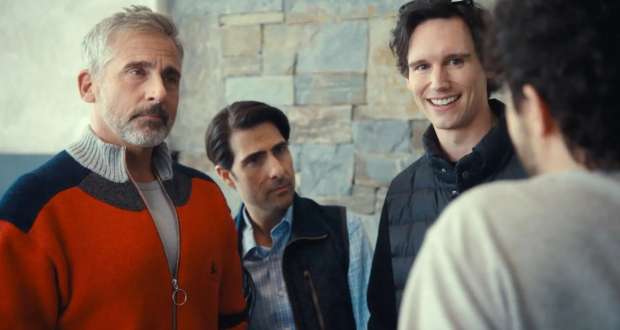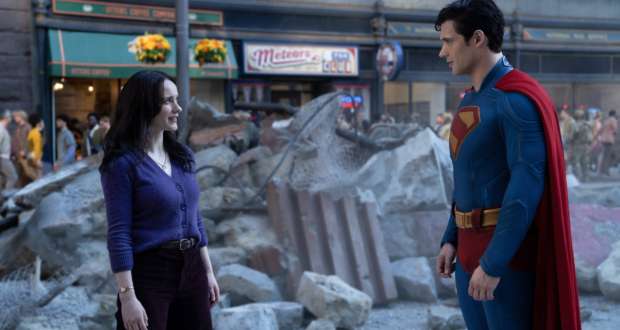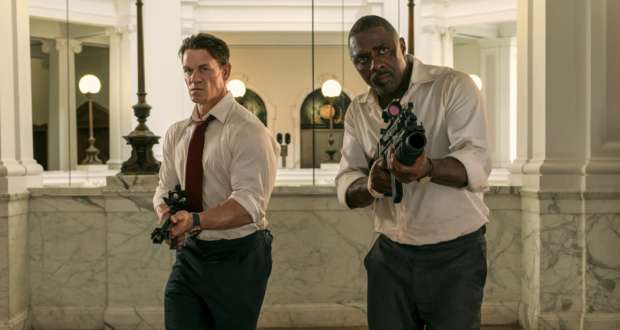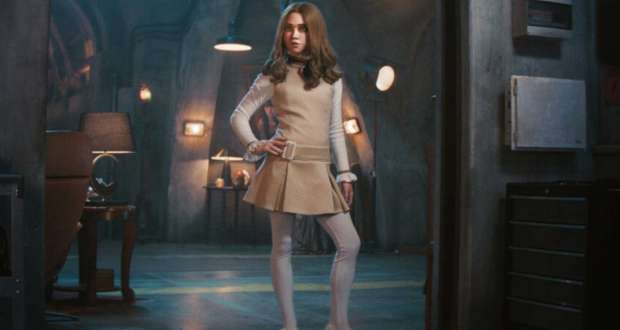Jesse Armstrong, the acclaimed writer behind Succession, makes his directorial debut with Mountainhead, a satirical comedy-drama that takes aim at Silicon Valley excesses, the disintegration of moral compasses, and the sinister creep of technological disinformation. Featuring a star-studded cast led by Steve Carell, Jason Schwartzman, Cory Michael Smith, and Ramy Youssef, the film delivers a sharp, if occasionally uneven, dissection of power dynamics among the billionaire elite — a comedic yet unsettling exploration of how friendships corrode under the weight of ambition and paranoia.
A Promising Directorial Debut:
Set in a luxurious, isolated mountain retreat aptly named “Mountainhead” — a tongue-in-cheek nod to Ayn Rand’s The Fountainhead — the film gathers four ultra-wealthy tech magnates for what’s billed as a weekend of relaxation. Of course, given Armstrong’s knack for unmasking corporate sharks, it’s no surprise that the retreat swiftly devolves into a battleground of betrayals and hidden agendas. Venis “Ven” Parish (Cory Michael Smith), the slick owner of the social media giant Traam, arrives with his own self-serving motives: he’s desperate to buy out Jeff Abredazi’s (Ramy Youssef) AI fact-checking firm, Bilter, in order to mitigate the fallout from Traam’s role in spreading global chaos.
A Web of Ulterior Motives:
Jeff, meanwhile, is the lone wolf among these moguls — his Bilter technology has ironically profited from the very disinformation it was designed to combat, and he’s loath to let Ven’s empire subsume it. Rounding out the quartet are Randall Garrett (Steve Carell), the group’s elder statesman, facing mortality with a terminal cancer diagnosis and a blind faith in technological salvation, and Hugo “Souper” Van Yalk (Jason Schwartzman), the resident man-child whose desperation to cross the billion-dollar threshold adds a comedic dimension to the tense proceedings.
Armstrong’s Signature Dialogue and Performances:
Armstrong’s screenplay shines in its portrayal of the group’s shifting alliances, punctuated by lacerating wit and darkly humorous exchanges. The dialogue brims with Armstrong’s signature blend of biting sarcasm and moral ambiguity, drawing viewers into the internecine squabbles with unsettling ease. Carell is particularly effective as Randall, balancing the gravitas of a man facing his own demise with the unsettling cheerfulness of someone who still believes technology can conquer the human condition. Schwartzman’s Souper is both the comic relief and a tragicomic figure — a man too rich to be relatable yet too insecure to wield real influence.
Mountainhead impresses with its stark, minimalist cinematography. The mountain setting feels both vast and claustrophobic, reflecting the characters’ isolation from the crumbling world outside — and their own moral desolation. Armstrong and his cinematographer utilize long takes and tight framing to highlight the increasing tension between the men, particularly in scenes where alliances fracture and re-form like a grotesque game of chess.
An Uneven but Thought-Provoking Middle Act:
However, while Armstrong excels in building tension and crafting sharp character moments, the film occasionally struggles with pacing. The middle act feels stretched thin, as if the film is treading water while waiting for the inevitable showdown. Some subplots, like Souper’s desperate pitch for his app Slowzo, flirt with biting satire but occasionally get lost in the shuffle of heavier themes. A tighter edit might have maintained the narrative momentum that the first act so deftly establishes.
Thematically, Mountainhead is strongest when it explores the consequences of technology’s unchecked spread. Armstrong’s script masterfully skewers the hypocrisy of tech moguls who talk about “connecting the world” while profiting from its unraveling. The film raises uncomfortable questions: How far would these men go to protect their wealth and power? Is there any line they won’t cross when self-preservation is at stake? Yet Armstrong resists easy answers, leaving the audience with a lingering unease rather than a clear moral resolution.
A Cast That Elevates the Satire:
The performances elevate the film’s satire into something more complex. Youssef’s Jeff is both cunning and surprisingly empathetic — a man caught between his idealism and the gravitational pull of survival. Michael Smith’s Ven is chillingly believable as a CEO whose corporate grin masks a ruthless opportunist. Carell delivers perhaps the most affecting performance, using Randall’s illness not just as a plot device but as a window into a man wrestling with mortality and the seduction of technological salvation. Schwartzman’s Souper is both hilarious and heartbreaking — a testament to Armstrong’s skill at balancing the comedic and tragic aspects of these characters.
Armstrong’s direction shows promise, especially in his handling of ensemble dynamics and his unflinching approach to satirizing the modern tech landscape. The film’s climax, while darkly comedic, feels earned — a culmination of mounting tensions and the characters’ moral decay. However, some may find the film’s refusal to offer catharsis or clear heroes frustrating. In true Armstrong fashion, Mountainhead leaves us with the unsettling realization that these men might continue their destructive games long after the credits roll.
Overall:
In the end, Mountainhead is a sharp, occasionally meandering, but ultimately rewarding satire that captures the zeitgeist of our AI-fueled disinformation age. It doesn’t always hit its mark — a few scenes could have been trimmed, and some character arcs feel more schematic than fully realized — but Armstrong’s directorial debut is an accomplished, thought-provoking examination of greed, mortality, and the morally murky world of Big Tech.
Mountainhead might not be as consistently compelling as Armstrong’s best work, but it’s a solid first feature: insightful, funny, and all too relevant in a world where billionaires plot the future over luxury retreats.
Mountainhead Review: A Biting Satire on Tech Moguls
-
Acting - 7/10
7/10
-
Cinematography/Visual Effects - 6.5/10
6.5/10
-
Plot/Screenplay - 6.5/10
6.5/10
-
Setting/Theme - 6/10
6/10
-
Watchability - 6.5/10
6.5/10
-
Rewatchability - 5/10
5/10
Overall
User Review
( vote)Summary
In the end, Mountainhead is a sharp, occasionally meandering, but ultimately rewarding satire that captures the zeitgeist of our AI-fueled disinformation age. It doesn’t always hit its mark — a few scenes could have been trimmed, and some character arcs feel more schematic than fully realized — but Armstrong’s directorial debut is an accomplished, thought-provoking examination of greed, mortality, and the morally murky world of Big Tech.
Pros
- Armstrong’s script deftly skewers tech mogul hypocrisy and the erosion of human values in the digital age
- Steve Carell, Jason Schwartzman, Cory Michael Smith, and Ramy Youssef bring nuance, depth, and dark humor to their roles
- The mountain retreat serves as both a luxurious prison and a symbol of moral decay, beautifully captured by the cinematography
Cons
- The middle act feels meandering at times, with some subplots overstaying their welcome
- Some thematic points are delivered too obviously, reducing subtlety
Summary: Jesse Armstrong, the acclaimed writer behind Succession, makes his directorial debut with Mountainhead, a satirical comedy-drama that takes aim at Silicon Valley excesses, the disintegration of moral compasses, and the sinister creep of technological disinformation. Featuring a star-studded cast led by Steve Carell, Jason Schwartzman, Cory Michael Smith, and Ramy Youssef, the film delivers a sharp, if occasionally uneven, dissection of power dynamics among the billionaire elite — a comedic yet unsettling exploration of how friendships corrode under the weight of ambition and paranoia.

















